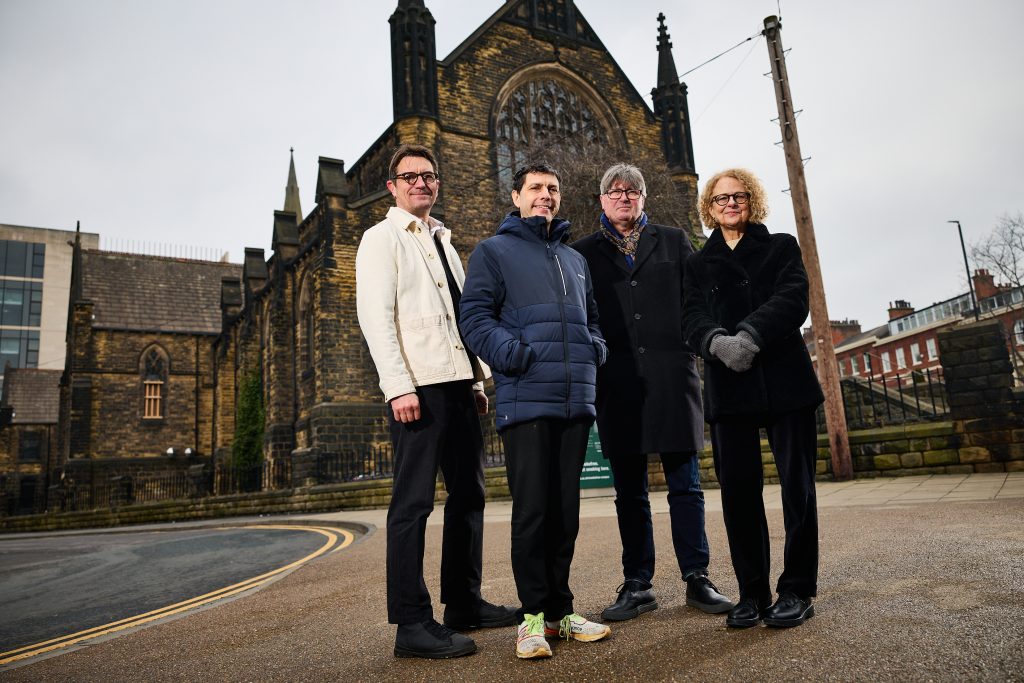
L-R: Nick Barley, Director National Poetry Centre; Alex Sobel MP; Simon Armitage; Ruth Pitt, Chair National Poetry Centre. Credit: David Lindsay
For as long as we’ve had language, we’ve had its artistic form: poetry. On the British Isles, poetry is the tool that’s helped us mark history, to heal from war, to grapple with our psyche and design our identity, as individuals and as nations.
But only now is momentum building behind a National Poetry Centre: a space and organisation coming to Leeds to platform and produce poets and poetry, cultivating the art form in Britain and beyond. Planning has started, and in 2028 doors will officially open.
Why is this happening now?
“Well, why the hell hasn’t it happened yet?” says Nick Barley, director of the National Poetry Centre. “We have at least a 1,500 year history of poetry in this country, and there is no national centre coordinating and amplifying all the activity that’s going on today.
“So, why not now?”
Nick is giving his first in-depth interview in post, and off the back of confirmation in February that the Centre would get a £5m funding boost from the UK government. The project will result in a new headquarters, built on Woodhouse Lane in Leeds, and an organisation responsible for elevating “the position of poetry in national life, becoming the spiritual home for poetry as it is written, read, spoken and performed – up and down the country.”
The boost is part of a £20m capital investment in the Poetry Centre. Enthusiasm to back a project like this is down to a combination of government need, on national and regional levels, to back the creative industries, as well as the ardent campaigning of the Centre’s founder & chief ambassador, the poet laureate and Leeds lad Simon Armitage – his recent eloquence on the Centre’s role for Channel 4 can be watched here.
And for Nick, it’s about more than just timing and hard work – it’s also thanks to a renewed demand for the artform. “It’s only really since the rise of social media that poetry has had an extraordinary resurgence,” explains Nick. Instapoetry since the late ‘10s and BookTok today has nurtured a bigger online audience, who’ve contributed to poetry book sales hitting record numbers in 2023 and 2024. Rappers are the main character of today’s mainstream, whilst out and out spoken word artists like Kae Tempest & For Those I Love continually break into popular music. Poetry’s boundaries have softened, to make it more versatile and accessible than it has been in a long time. Nick feels the artform is no longer “something that can’t be a career”, but offers genuine professional opportunity beyond a creative hobby.
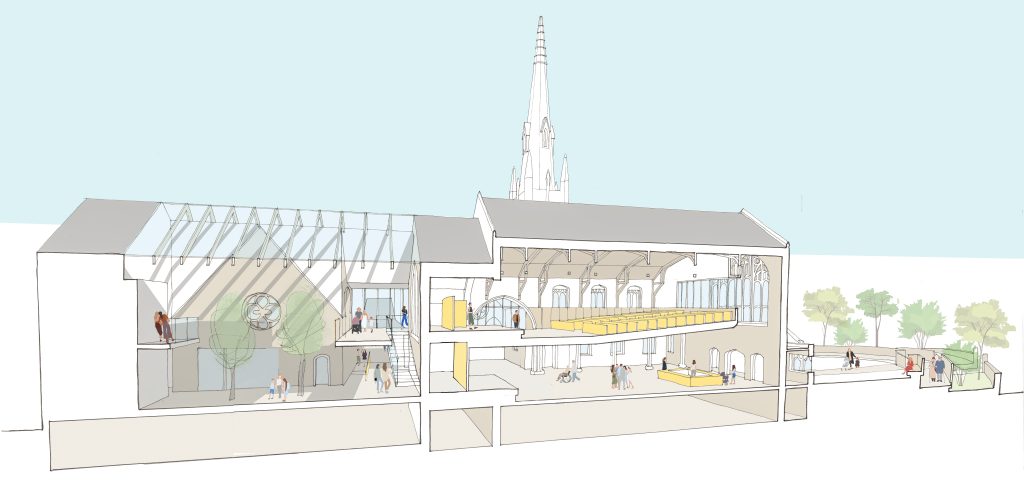
Blueprint design for the building. Copyright: Gagarin Studios
Poetry is hitting a bit of a peak, something the Centre is in place to capitalise on, and continue. They’ll be governed by four key tenets: “everyone can be a poet”, “everyone can be better at [poetry]”, poets must be “brave and brilliant”, and “connections, networks and listening to each other” are central to success. Already they have initiatives planned that demonstrate their ethos, including:
- A national roll-out of the Young Poet Laureate scheme to 1000+, with winning poets becoming ambassadors and new schools participating each year.
- The Hope Collective project, a partnership with Yorkshire NHS Trusts, to give voice to people experiencing mental health crises through poetry published in anthologies.
- An exchange project with Brazil exploring sound system culture through collaborative work between writers from both countries, culminating in performances in Leeds and Rio de Janeiro.
The Centre is also dipping into the festival circuit, recently announcing plans to curate a day of poetry at Latitude Festival 2025.
Projects like this hint at the outward-looking activity the Centre will attempt, whilst building towards the official launch in 2028. The launch will be a big moment for the UK in laying a blueprint – there isn’t much global precedent for stuff like this, apart from maybe Versopolis in Europe, or the Chicago Poetry Centre. But it will also be a real moment for Leeds. You might be surprised a project like this isn’t going to London, where most artforms house their headquarters. So, why was Leeds selected this time?
“Simon [Armitage] felt a city outside of London would be more appropriate,” explains Nick, and certainly this project reflects the broader national funding strategy of investing outside the capital. But to those in the city that have been paying attention, and to Nick, there is an even more obvious reason:
“Leeds is home to some of Europe, if not the world’s, best poets.” The city already has a strong poetry reputation thanks to Khadijah Ibhrahim, Malika Booker, Jason Allen-Paisant, Kayo Chingonyi, Tony Harrison, Armitage himself – and of course Matt Abbott and Maria Ferguson, who are “great examples of the activity and energy around Leeds” (the former once using a column on The State of the Arts to update the city on its latest poetry happenings).
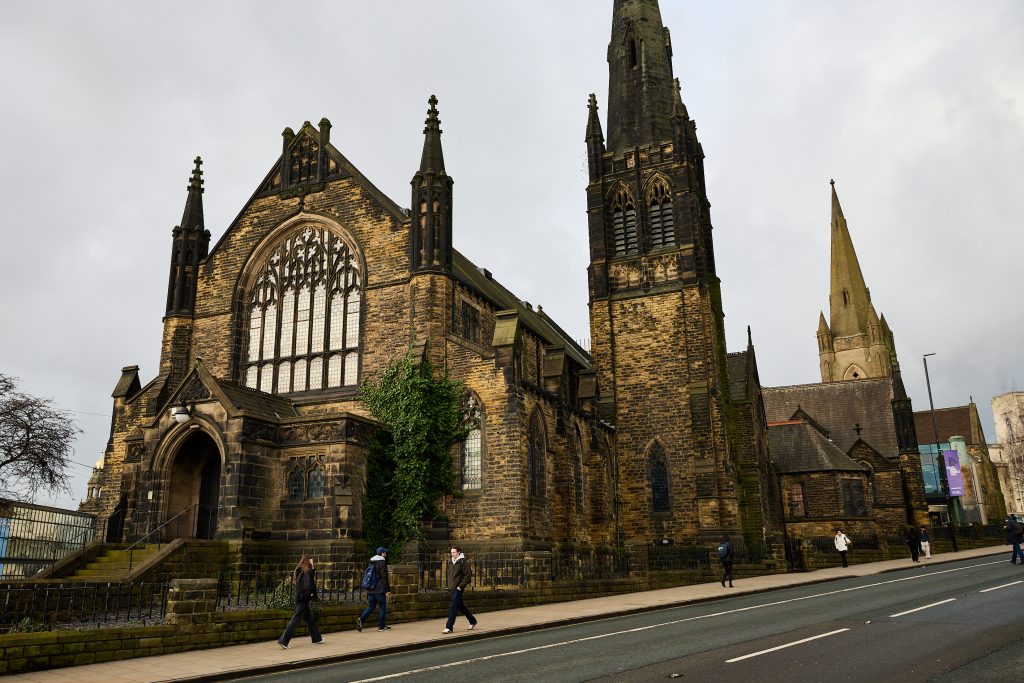
The soon-to-be HQ for the National Poetry Centre in Leeds. Credit: David Lindsay
Leeds, with so many people passionate about supporting poetry, is a natural home for the Centre. They will be working closely with venues in the city, already hosting great literature and poetry events, so they can “amplify the scene as much as possible”, while established poets in Leeds can expect to access “support, audience, showcases, and opportunities to network with agencies and publishers that can help them break through to the next level”.
It’s not just the poetry scene that stands to gain from the Centre’s arrival. “Our presence,” Nick argues, “will draw more attention and more money into the city for wider culture.” As well attracting publishers, literary organisations, and tourists, the spillover impact of the Centre’s activity can benefit the local economy and other culture. He stresses that they will not be drawing attention or resource away from others, but will help increase an audience for art that music venues, galleries, bars and restaurants can also enjoy, citing his previous home city as an example:
“Before this, I worked in Edinburgh [as Director of the International Book Festival] – it used to be a Calvinist, buttoned up city, with little to celebrate in the way of culture before it was selected as a festival city in 1947.” This kicked off a 40 year transformation which meant Edinburgh “became seen as an attractive place to live, an attractive place to visit, a cultural city. There are lessons to be learnt from that,” says Nick: “When a city really devotes itself to being a cultural city, it can make things happen not just for certain organisations but for the whole city.”
In an era where we fear for our cultural spaces, the National Poetry Centre is an opportunity for original ideas to be forged in Leeds, for talent to come through our city, for the city to play a leading role in a poetry sector that’s growing year on year. It might not transform Leeds alone, or overnight, but it can play a part in firmly placing Leeds’ in conversations about culture across the world, putting our poets & artists centre stage whilst it does.
“I’m completely convinced that the Centre will be part of a new narrative for Leeds,” Nick states firmly. “Leeds will be the new literary hub in the UK.”
***
Sign up to the Centre’s newsletter to stay up to date with programme and building developments, and follow them on socials.
Filed under: Written & Spoken Word
Tagged with: interview, leeds, literature, Maria Ferguson, Matt Abbott, national poetry centre, Nick Barley, Simon Armitage, spoken word, yorkshire

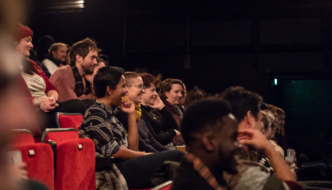
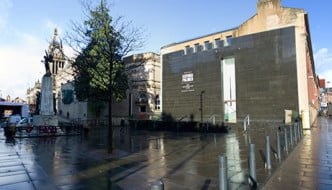
Comments